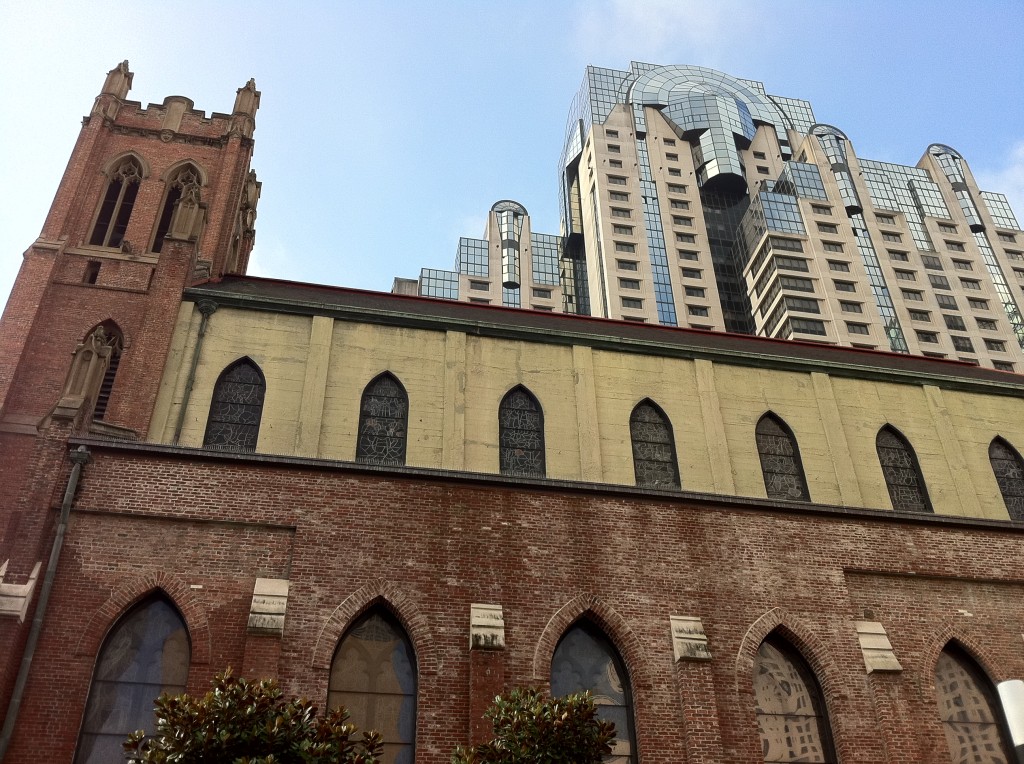This week I’ve returned from the annual meeting of the American Academy of Religion in San Francisco, California, and come into the annual family traditions of gathering for the Thanksgiving holiday. I’m feeling a kind of cognitive and spiritual dissonance. This is not a new set of feelings or insights, just especially sharp and poignent.
For starters the sticker price on the trip to San Francisco is so high. I’m not complaining out of my own financial need. The income that I and my family earn, and the institutional support that my employers allow, makes a trip like that possible, even expected. It is an opportunity to make professional connections, advance my work, share important ideas, and participate in the production of new knowledge. That knowledge holds the promise of deepening understanding and contributing to improving, healing and/or caring for the world. This is an optimistic view, I know. But I wouldn’t go to meetings like the AAR, if I couldn’t see some potential good in them.
At the same time, the benefits and privileges that are a part of this academic world, even the books and articles we write, the travel and freedom of movement we enjoy, are part of the affluence and influence of corruptible power. And such power and privilege depends for its strength on both past and present losses and harms to other human beings and the ecology of the planet as well. Slave and immigrant labor are at the base (historically and presently) of making possible the worlds of knowledge-production. This is a reminder that white folks do not really like hearing.
There is no simple either/or solution to such a dilemma. We don’t have the straightforward choice of either being a partner and leader in the knowledge economy OR walking away from the use of that power altogether. There is no escape from the dynamics of power. Histories of racism, sexism and poverty will not disappear if we simply make a better choice in a moment, for our careers, or in our communities.
After a wonderful and abundant meal today at my in-laws’ house, we cleared dishes then spread the table with gifts that we had purchased for a family in need. Taking part in purchasing clothing, toys, gift cards for Christmas for a mother in recovery from drug addiction, and a grandmother and two children, is a right and good thing to do. But charity or even a “hand-up” are not adequate alone as a response to widespread poverty, addiction and need. If we take on such tasks mainly to ameliorate our guilt, it will be only a temporary fix, and worse that approach holds seeds for continuing to grow the problems rather than heal them in a sustainable way.
Repeatedly over the past week the dilemma of living in spaces in which I am both oppressed and oppressor at the same time, caught in the middle between privilege filled with responsibilities on one hand and the damaging effects (both received and inflicted) on the other. But as I’ve come to see through years of thinking about these dynamics, and paying attention to others wiser than myself, one of the large challenges is to participate when possible in the changing, improving or healing of the world. At other times, the geratest gift and challenge is to do no further harm.
So claiming my role as an ally and advocate for living in the midst or aftermath of systemic racism, poverty, sexism, homophobia and other oppressions, is one step out of the quicksands of guilt and paralysis. Seeking God’s forgiveness for the harms both in and out of my awareness in which I’ve participated is important. Speaking truth to power takes courage and willingness to give up something of that privilege and power in order to participate in much needed change.
So I’m thankful on this day. As I put it on facebook earlier: “Grateful and blessed . . . And hoping to love and serve the world out of that abundance and gratitude.” And I’m motivated to keep reaching for ways to shift boundaries and welcome more folks to the tables where I work and worship and live. And I’m motivated to keep searching for sustainability in that living. I want a gratitude that is not merely a glib cover for oblivious privilege. I want participation and partnership in changing myself and the situations where I’m investing my life. And I hope for wisdom to know when to shake the dust from my feet and move on.
Here is how poet, activist, and radical feminist, Audre Lorde put it: “survival is not an academic skill. It is learning how to stand alone, unpopular and sometimes reviled, and how to make common cause with those others identified as outside the structures in order to define and seek a world in which we can all flourish. It is learning how to take our differences and make them strengths. For the master’s tools will never dismantle the master’s house. They may allow us temporarily to beat him at his own game, but they will never enable us to bring about genuine change.”




